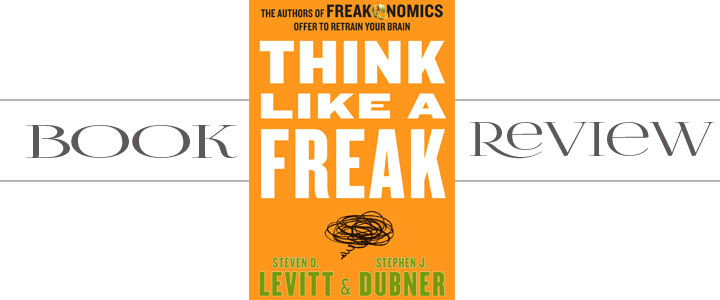
Think Like A Freak
by Stephen J. Dubner, Steven D. Levitt
Series: Freakonomics #3
Published: May 12, 2014
Genres: Audiobook, Non-fiction
Format: Audiobook (7 hrs 5 mins)
Source: Purchased
moreThe Freakonomics books have come to stand for something: challenging conventional wisdom; using data rather than emotion to answer questions; and learning to unravel the world's secret codes. Now Levitt and Dubner have gathered up what they have learned and turned it into a readable and practical to...
Short and Sweet Version
If you’re an avid Freakonomics podcast listener, like me, you won’t find much new in this book. Still, I really enjoyed the ideas and had fun applying them in my life. It’s all about critical thinking and new ways to approach problems that you might not have thought of before.
Jessica Thinks Too Much Version
Think Like A Freak is all about approaching problems in ways you hadn’t thought of before to actually solve them. We go about problem solving the wrong way sometimes because we put private benefit over the greater good. We also have this mentality that there is a right way and a wrong way to solve problems. More of us need to think like a Freak which more or less means this:
The modern world demands that we all think a bit more productively, more creatively, more rationally; that we think from a different angle, with a different set of muscles, with a different set of expectations; that we think with neither fear nor favor, with neither blind optimism nor sour skepticism. That we think like–ahem–a Freak.
-Steven D. Levitt & Steven J. Dubner, Think Like A Freak pg 8
Here’s a simplified list of what the first two Freakonomics books were about. This book is different because they discuss in more depth HOW they did those things.
- Incentives are the cornerstone of modern life
- Knowing what to measure, and how to measure it, can make a complicated world less so
- The conventional wisdom is often wrong
- Correlation does not equal causality
If you want a single word to describe all advice on Facebook, here it is:
Just because you’re great at something doesn’t mean you’re good at everything. Unfortunately, this fact is routinely ignored by those who engage in–take a deep breath–ultracrepidarianism, or “the habit of giving opinions and advice on matters outside of one’s knowledge or competence.”
-Steven D. Levitt & Stephen J. Dubner, Think Like A Freak pg 28
I had never realized how much value there is in admitting you don’t know something. People fake it because looking like you don’t know something, especially if everyone thinks you should know something, has more consequences than just making up something. We all do it. At the very least, it gave me permission to say “I don’t know” to my kids more often.
This small quote changed my perspective on learning.
The key to learning is feedback. It is nearly impossible to learn anything without it.
– Steven D. Levitt & Stephen J. Dubner, Think Like A Freak pg 34
I get stuck in the trap the feedback = criticism which leads to hurt feelings. They give an example in the book of learning to bake bread. If you have never baked bread in your life and you are not allowed to try it and make mistakes the chances of you succeeding are almost none. The two ways you can learn something are:
- Trying it out and using the feedback from your experiments to do better next time
- Have a teacher, who will also give you feedback on what you are doing to guide you in the right direction
It’s so simple and yet I had never thought about it that way before. You can’t learn anything without feedback! It changed the way I viewed teaching my piano students. I now see that me making little adjustments to what they are doing is essential to learning instead of being hurtful.
In most situations, it’s easy to get feedback but reading this made me realize how many things I’m doing that have no feedback. Raising my kids, running my book club, doing the laundry, cleaning my bathroom, running my blog, writing these reviews – I don’t get much feedback on how I do those things. Most of the time I just stick with the first thing I did and hope it doesn’t turn to crap. It made me more aware of the decisions I make that are not based on feedback because I don’t have it or I didn’t bother to gather it. I want to do more experiments in my life so I can have actual feedback and make better decisions.
The best experiment I ever did was figuring out how to get my dishwasher to actually clean my dishes. A couple years ago, we lived in a rented townhouse and it had a basic dishwasher. We would pre-rinse the dishes as much as we could, but every time they came out they would be covered in tiny bits of food. Glasses that had been used for drinking water were now dirtier than when they went in. Obviously that must mean we weren’t using enough detergent, so we used more dishwasher detergent. Didn’t help. Convinced that our dishwasher was broken, we called the maintenance guy. Unlike me, he had experience with using and fixing lots of dishwashers. Or in other words, he had lots of feedback. He told me my dishwasher was most likely clogged with detergent so it wasn’t draining properly and instead of my dishes being rinsed with clean water, they were being rinsed with the dirty washing water that hadn’t drained all the way. Ew. Gag. I also didn’t believe him. I thought he was trying to get out of fixing our stupid, broken dishwasher. When I told him that, he decided to prove it to me. He ran my dishwasher empty – no detergent or dishes. After it had been running for about 10 minutes, he opened the door. The entire bottom of the dishwasher was covered in suds. The only place the suds could have come from was inside the dishwasher, clogging the pipes like he said. He told me to get some dishwasher cleaner and run it empty until there were no more suds. It took 3 times to get it all the way clean. After that, I experimented with doing my dishes. I’ve always believed that it’s dumb to wash your dishes before you put them in a dishwasher.
What happens if you just stick gross, disgusting dishes with 2-day-old caked on food straight in the dishwasher? I was going to find out. Turns out, they come out much cleaner than you’d think (once your dishwasher isn’t clogged with detergent anymore). My experimenting revealed that caked on spaghetti sauce and cheese wouldn’t come off very well in that particular dishwasher (my new dishwasher will get spaghetti sauce off like a dream). Other than that, everything came out clean. Plates with huge blobs of ketchup – straight in the dishwasher. No pre-rinsing. Pans that most sane people would soak – straight in there. Food that was so caked on that I couldn’t even scrape it off – dishwasher! The caked-on kind came out 80% clean and then I would hand wash them after the dishwasher had done most of the work because I figured, why prewash ALL of the dishes when only some of them actually need it? Putting them all in no matter what and then washing the ones that came out dirty afterwards saved time because then I only had to wash the ones that needed it. Since it was draining properly, the gross dishes weren’t getting the other ones dirty. I would like to add that of course I scrape food off into the garbage can but anything that is so stuck on that scrapping won’t get it off is the dishwasher’s job.
I then experimented with different brands and types of detergent. The one that got my dishes the cleanest was the plastic tabs with powder inside them. Powder dissolves better and doesn’t clog up the drain like liquid detergent does. I tried turing the heat-dry cycle on and off. Turning the heat-dry off makes it easier to clean the dishes that didn’t get all the way clean, but it leaves the tupperware wet and you have to shake it off before putting it away.
TL;DR – don’t do the dishes in the dishwasher the way your mom taught you. Clean it out and experiment to see what your dishwasher can really do. Hint – it can do more than you think, even the old, basic models.
My next favorite chapter was about thinking like a child. Try to make things fun. I try to turn chores into games because I think I hate cleaning as much as my kids do. One of my favorite games I made up was Laundry Basketball. I turn on the washing machine and tell the kids to see how many shots they can make with their dirty clothes. My mom is convinced that in college they are going to round up their roommates and play Laundry Basketball with them.
Incentives easily backfire. Say hello to my kid’s sticker covered potty training toilet that achieved nothing. Incentives work for people who think just like you, but most people don’t think like you do. Can I just say that I love this list on how to use incentives the right way? It’s come in really handy so far.
How to Bribe Your Kids the Right Way – Incentives 101 (pg 135)
- Figure out what people really care about, not what they say they care about.
- Incentivize them on the dimensions that are valuable to them but cheap for you to provide.
- Pay attention to how people respond; if their response surprises or frustrates you, learn from it and try something different.
- Whenever possible, create incentives that switch the frame from adversarial to cooperative.
- Never, ever think that people will do something just because it is the “right” thing to do.
- Know that some people will do everything they can to game the system, finding ways to win that you never could have imagined. If only to keep yourself sane, try to applaud their ingenuity rather than curse their greed.
After reading that list I realized that the perfect incentive for my kids is video games. My kids LOVE video games. They would be completely addicted zombies by now if I let them. But it makes the perfect incentive because they really care about it, it’s cheap for me to provide, and they will do almost anything to get it. They have done dishes, laundry, picked up toys, and even cleaned toilets to get to play for 30 minutes.
How do you do the dishes?
I know this is a weird discussion question, but I’m so intrigued by how people do them. Do you pre-rinse? Do you hand wash them? Do you point the forks up or down? What detergent do you use? Rinse-aid or no rinse-aid? I want to know it all! I’m bizarrely curious about this chore that I hate doing.
Content Rating: Mild, for very mild language (if there even is any language. I don’t actually remember any swearing but if it’s there I know it’s mild.)
This post contains affiliate links and I receive a small percentage of sales made through these links.
Reading this book contributed to these challenges:










 My name is Jessica. I love to read Young Adult and classic literature. I’ve been a book blogger for six years and I haven’t gotten tired of it yet. I’m a very curious reader. Writing about all the questions and thoughts I had while reading a book is the best hobby ever.
My name is Jessica. I love to read Young Adult and classic literature. I’ve been a book blogger for six years and I haven’t gotten tired of it yet. I’m a very curious reader. Writing about all the questions and thoughts I had while reading a book is the best hobby ever.
I’ve heard great things about these books. I need to read them. Your dishwasher story was fascinating. I’m definitely going to try your suggestions. Wahoo!
Lol! This is fantastic! I’m glad Jessica did so much thinking in the Jessica Thinks To Much Version. It is neat to see someone go through a book designed to help them improve their life or thinking, and actually immediately get to work trying to implement that new perspective. This sounds like it was a rewarding experience for you. I’ve been reading Scott Adams’ “How to Fail at Almost Everything and Still Win Big,” which has had a lot to say about what plays into our happiness and success, and how conscious decisions about how we think can do a lot of shaping of our attitude and future. Think Like a Freak sounds like it was great, and since I don’t listen to the podcast, I bet there’d be a lot in it for me! Great review :)